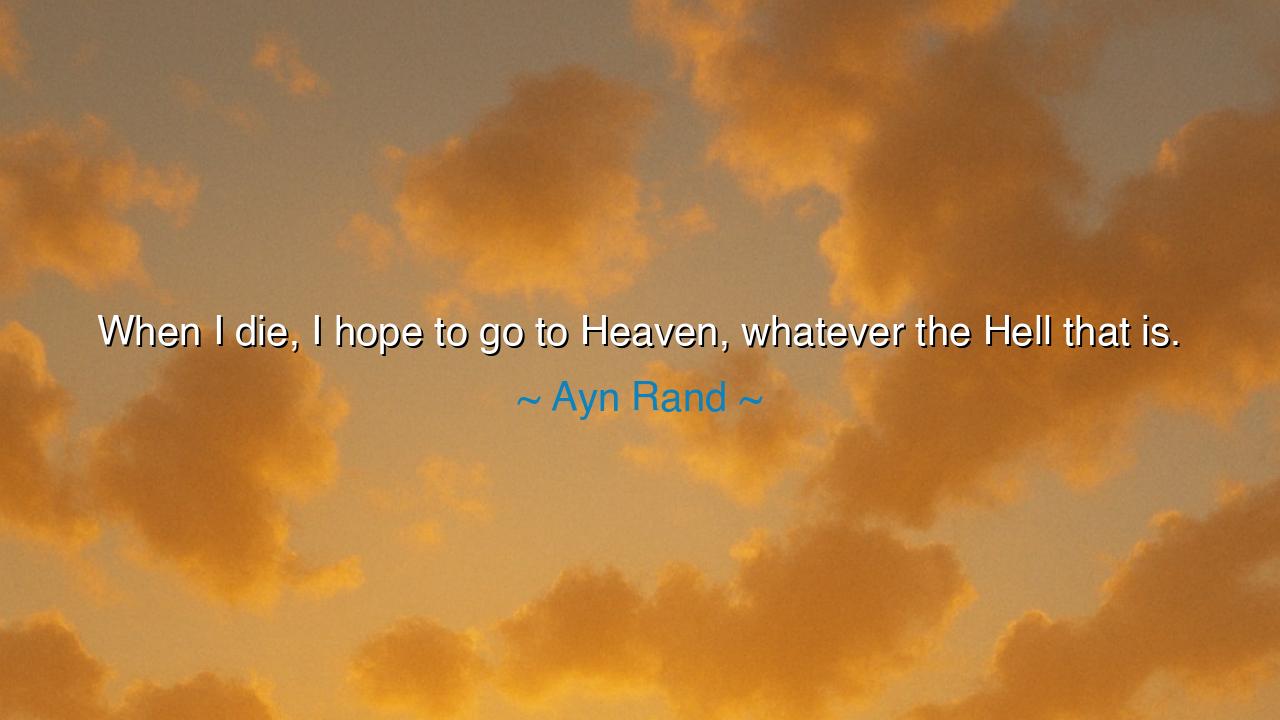
When I die, I hope to go to Heaven, whatever the Hell that is.






“When I die, I hope to go to Heaven, whatever the Hell that is.” So spoke Ayn Rand, a thinker forged in the fires of defiance and reason, whose words carried both irony and truth. At first, her statement may seem irreverent, almost mocking. Yet within it lies a profound and ancient tension — the eternal struggle between faith and doubt, ideal and reality, heaven and earth. For what Rand speaks of here is not a denial of Heaven, but a questioning of its meaning — a challenge to the listener to seek their own understanding of paradise.
In her words, we hear the voice of one who does not accept truths simply because they are handed down. Rand, like the philosophers of old, dared to ask: What is Heaven? What is goodness? What is the reward of the soul? Her statement is half jest, half lament — for she stands at the edge of life, gazing toward eternity, uncertain whether the realm promised by priests and poets is any better than the one she has built in her mind. She hopes for Heaven, yes — but she does not surrender her reason to anyone else’s definition of it. In that paradox lies the fierce freedom of her spirit.
Heaven, in Rand’s sense, is not a place above the clouds, but a state of clarity and purpose. It is the triumph of one’s own vision, the peace earned by living honestly and without compromise. To her, the true damnation — the real Hell — is a life lived in imitation, a life of fear and submission to another’s creed. Her humor cuts sharply: she hopes for Heaven, whatever the Hell that is — as if to say, “Even if Heaven exists, I will not enter it blindly. I will enter it on my own terms.” This is not arrogance; it is integrity — the insistence that even in death, the mind must remain sovereign.
Throughout history, there have been souls who shared this restless questioning. Consider Socrates, who, when condemned to death, spoke calmly of the afterlife. He did not claim certainty about what lay beyond; instead, he said that death might be “the greatest good,” or perhaps “nothing at all.” But he feared neither possibility. His Heaven was the peace of a clear conscience, the knowledge that he had lived truthfully. Like Rand, Socrates sought not comfort but truth, and found divinity not in the heavens, but in the honest pursuit of wisdom.
Rand’s quote, though born in an age of modernity, echoes the spirit of the ancients — those who refused to trade their reason for faith, yet who still hungered for meaning beyond the material. There is both skepticism and hope in her tone: she hopes for Heaven, but not the Heaven described by others. She mocks the empty certainty of dogma, yet in her mockery burns a longing — the longing for a world pure of hypocrisy, radiant with understanding, where truth itself might be divine. In that longing, she becomes not merely a skeptic, but a seeker.
And perhaps that is her greatest revelation: that one can doubt and still hope. For even the rationalist yearns for something beyond the flesh — a place, or perhaps a state, where the soul is at peace with its own creation. Rand’s Heaven, then, is the fulfillment of the self — a realm where one’s works, one’s ideas, and one’s integrity stand as monuments. It is the Heaven of the creator, not the follower. The Hell she jokes of is the Heaven that others impose upon her — one that demands faith without understanding, obedience without thought.
The lesson, then, is both humbling and empowering: question everything, but never stop hoping. Seek Heaven, but define it through your own truth. Live not for the promise of reward, but for the joy of creation. Let your life itself become your Heaven — built from courage, honesty, and purpose. For when the end comes, it will not matter whether Heaven is a cloud-filled kingdom or a silent void. What will matter is whether you lived as the author of your own soul.
And so, to those who listen, remember Rand’s half-smile as she spoke those defiant words. They are not words of disbelief, but of independence. Hope for Heaven, yes — but hope for a Heaven worthy of your spirit. Do not let the world define it for you. Build it here, in the light of your days and the work of your hands. For if there is a Heaven beyond, it will surely open its gates not to the obedient, but to those who lived as creators of their own eternity.






AAdministratorAdministrator
Welcome, honored guests. Please leave a comment, we will respond soon